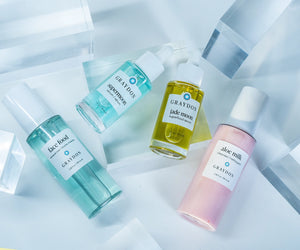IN THIS ARTICLE:
- What is rosehip oil?
- What makes rosehip oil such a wonderful ingredient?
- Who is rosehip oil good for?
- Rosehip oil in Graydon Skincare products
Other names: Rosa Canina Fruit, Oil Rosa Canina Seed Oil, Rosa Rubiginosa Seed Oil, Rosa Moschata Seed Oil
What it is: antioxidant, emollient, skin conditioning, pro-aging
You can find it in: Skin Stuff Face + Eye Cream
What is rosehip oil?
First, let’s talk about the origin of this oil.
Rosehip (AKA: rosa canina or dog rose) is a type of climbing rose species that’s native to Europe, northwest Africa and western Asia.
It is a shrub that typically has a height of 1-5 metres. However, it can also grow taller by climbing up the crowns of taller trees. Like other types of roses, its body is covered with small, sharp, hooked thorns, helping it to climb. Its flowers are usually pasty pink, with slight variations depending on the growing region.

Rosehip oil is a pressed seed oil which is extracted from rosehip plants. Unlike rose water or rose oil which is extracted from the flower petals, rosehip oil is extracted from the seeds and fruits of the plant. It’s important to note that the extraction method of the oil matters! Typically, the cold-pressed extraction method yields the best results because it allows the oil to retain its purity and goodness.
You may have noticed that rosehip oil is having a bit of a moment right now, and for all the right reasons too! In fact, I think rosehip oil is a superhero ingredient thanks to its many wonderful abilities.
What makes rosehip oil such a wonderful ingredient?
Rosehip oil offers more than just a pleasant name in an ingredient list; it also has a plethora of benefits for your skin.
For starters, rosehip oil is touted as a dry oil. This means that it’s less thick and can sink into the skin faster, allowing the following components of the oil to really work their magic!
Fatty acids
Rosehip oil is a nice emollient, meaning that it can condition your skin, making it softer and more supple. Specifically speaking, it’s a moisturizing plant-based oil loaded with skin-nourishing omega-6 fatty acids, specifically linoleic acid. Rosehip oil has a very high concentration of linoleic acid (roughly 54%).(1)
It’s been shown that acne-prone individuals tend to have sebum that's lower in linoleic acid and higher in oleic acid. It’s suggested that the lower percentage of linoleic acid in the sebum is a contributor to acne. This makes rosehip oil extremely beneficial for individuals with acne-prone skin.
In an early study,(2) researchers applied 2.5% linoleic acid on the facial skin of people with mild acne. After one month, the researchers re-evaluated by capturing digital images of the skin of these individuals. The results were amazing! They observed that their baby pimples had reduced almost 25% in size. This is wonderful because it offers a complimentary approach to treating acne. While most of the popular acne treatments like antibiotics, benzoyl peroxide and tea tree oil, focus on killing bacteria, linoleic acid is different because it provides the skin with a healthier environment.
Vitamin A
Another benefit of rosehip oil is that it’s also rich in vitamin A.
If you’re unaware, retinoids are compounds that are derived from vitamin A and their benefits in skincare have long been documented. One of the ways retinoids can benefit the skin is by increasing collagen production and preventing the breakdown of collagen.(3) As you may know, collagen plays a huge role in how your skin ages. Basically, collagen equals youthful, supple, resilient and beautiful skin!
Antioxidants
Specifically, rosehip oil contains an abundance of polyphenols, flavonoids, cinnamic acids, flavonols, carotenoids, vitamin C(1) (4) and vitamin E.(5) All of these compounds act as antioxidants that can help combat skin-damaging free radicals.
In case you weren’t aware, free radicals are responsible for destroying our skin’s collagen, leading to a plethora of skin problems like wrinkles, fine lines, dark spots and loose, saggy skin. A large contributor to free radicals is UV rays. Therefore, an antioxidant-rich ingredient like rosehip oil can help nourish your skin and combat the visible signs of sun damage.(6)
The best thing is that some of these antioxidants also have other benefits as well. Aside from being an excellent antioxidant, vitamin C (AKA: ascorbic acid) can also boost the collagen production of your skin,(7) making it a perfect teammate for the vitamin A in rosehip oil. Plus, vitamin C can also help fade hyperpigmentation.(8)
Vitamin E is another multifunctional component of rosehip oil. In addition to its antioxidant properties, it also boasts anti-inflammatory properties.(9) These properties may help calm UV induced skin-inflammation and it’s also suggested that vitamin E can help with chronic inflammatory skin conditions such as psoriasis and eczema.(5) (9)
Wound healing
Interestingly, rosehip oil has also been shown to promote wound healing. In a 2019 study,(10) researchers applied rosehip oil to the subject’s wound tissues from an excisional surgery. Results showed that rosehip oil significantly accelerated the wound healing process and effectively improved scarring.
Who is rosehip oil good for?
There are two types of people who will benefit greatly from rosehip oil: Individuals with acne-prone skin and those who are looking to help their skin age gracefully.
As we've already discussed, the linoleic acid in rosehip oil can strengthen the skin of acne-prone people, providing a better environment for the skin to heal from acne. Furthermore, its wound healing abilities may also help with acne scarring.
Those who are looking for a pro-aging regimen can also benefit from rosehip oil due to it being rich in vitamin A and antioxidants. Vitamin A can help your skin to produce more collagen, making your skin more supple. The antioxidants can also help by protecting your skin against skin-damaging free radicals.
However, if you don’t fall into either of these categories, rest assured that you can still add rosehip oil to your skincare routine. Being an oil, it can help prevent moisture loss. And thanks to its linoleic acid component, you can effectively moisturize your skin without worrying about breakouts.
Rosehip oil in Graydon Skincare products
If you’re looking to reap the benefits of rosehip oil, look no further than our Skin Stuff Face + Eye Cream.
Skin Stuff is an ultralight moisturizing cream that’s perfect for people with sensitive skin that reacts to just about everything. It’s enhanced with skin barrier protecting ingredients, such as ceramides, and offers soothing hydration for thirsty skin that’s also prone to acne.
Oh, and Skin Stuff also doubles as an eye cream!
________________
What are toners and what role do they play in your skincare routine? Click here to learn everything you need to know about toners.




